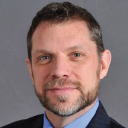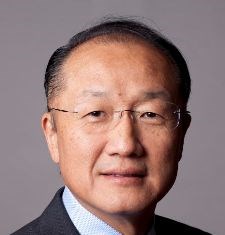The 15th annual Global Philanthropy Forum opened yesterday in Washington DC, bringing together some 350 participants from 25 countries. Jane Wales, president and CEO, introduced the conference by highlighting its evolution over the years: once centred on US-based cross-border engagement, the forum now claims a global focus, with members and participants from multiple countries and affiliate organizations in Africa and Brazil. In her opening remarks, Jane framed the guiding themes of the forum: how philanthropy, business and government can work more effectively – as individual sectors and, most importantly, collaboratively – to address large-scale social problems.
World Bank Group President Jim Yong Kim at the opening plenary
The opening plenary featured a conversation with World Bank Group President Jim Yong Kim.His remarks spanned a wide range of topics – his strong interest in setting tangible targets and adjusting strategy based on lessons learned; how while absolute poverty has been cut over the past several decades, much more work needs to be done to reach the poorest of the poor; the need to put inequality closer to the centre of the global development agenda; the centrality of investing in health and education for women and children; the need to look beyond dollars spent on development towards improving outcomes; the need to orient job training programmes to private sector needs; the need for better governance; and many other topics.
If Mr Kim’s remarks lacked a coherent message, they certainly offered a range of thought-provoking ideas for the audience. In introducing him, Jane Wales described the World Bank as a ‘disruptor of the cycle of poverty’. Progressive philanthropy and civil society would likely question Jane’s statement – for them the Bank has been a negatively disruptive force that worsens poverty. One came away from Mr Kim’s remarks sensing a commitment to changing that paradigm, valid or otherwise.
Rising to global challenges
Following lunch, the conversation pivoted to a very high level with a discussion on global trends, risks and rewards. Sean Cleary from the FutureWorld Foundation offered a picture of the planet we may well see in the decades ahead: a shift in the global economic epicentre from the Atlantic to the Pacific; higher financial returns to capital and falling returns to labour, resulting in rising inequality and increased social tensions; rising migration flows; a weakening of representative democracy; and rising pressure on the planet’s ecological limits, among other grave challenges.
Mr Cleary offered no solutions – that was perhaps not his role. The many questions he raised were in part explored in the following plenary, which focused on multi-sector collaboration to support communities in times of crisis. A diverse panel led by Zia Khan of the Rockefeller Foundation looked in particular at the challenge of resilience in an increasing complex and complicated world. In this context – that of global warming, increased water and food insecurity, population growth, failing states, and other grave challenges – humanitarian needs are growing. Speakers argued that collaboration is more important than ever and that a more effective division of labour – between government, the private sector, philanthropy and other players – is essential to rising to the challenge. For this to be effective, all sectors need greater capacity. The enormous capacities grassroots communities already possess was fully acknowledged. Echoing what Jim Kim noted in the morning, the full engagement of women and youth was highlighted as central to the change we seek.
A conversation with the Ibrahims
The first day of the forum concluded with a somewhat intimate and informal conversation with Mo Ibrahim and Hadeel Ibrahim of the Mo Ibrahim Foundation. On the Arab Spring, the Ibrahims were realistic but hopeful, rightly noting that political revolutions and democratization in the US, France and elsewhere were lengthy, bloody, and fraught with as many advances as setbacks. The changes we are seeing in the MENA region will take time, and we need to be supportive but patient.
Mr Ibrahim lamented what he sees as a ‘winner takes all’ culture in Africa and stressed the need for a more inclusive political process. The Ibrahims also shared thoughts on the massive youth gap in Africa: 50 per cent of the population is under 19, while the average head of state is 62 years of age. African leaders desperately need to find ways to close this gap and to build constructive bridges across the divide. A huge part of this must be a genuine focus on job creation, as 20 million young people enter the job market every year in Africa. Practical policy shifts and a stronger sense of opportunity are key. The kind of tragedy we saw this week in the Mediterranean speaks volumes to the crisis at hand. Mr Ibrahim posited that, had Barack Obama stayed in Kenya all his life, he’d likely now be a bus driver. What must be created across Africa is a sense of mobility and opportunity for Africa’s youth.
The Global Philanthropy Forum continues on 23 and 24 April – watch this space for my next blogs.
The Forum can be live-streamed at http://www.philanthropyforum.org/live. Individual sessions as well as full-day highlights are being posted and archived on YouTube. The Twitter handle is @GPForg, hashtag is #GPF15.
John Harvey is an independent global philanthropy professional.




Comments (0)